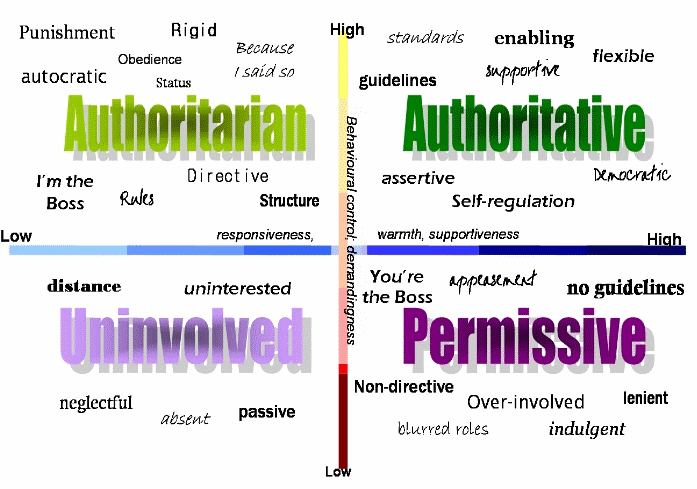Our beliefs in what is beneficial for our children determine the approach we take in parenting them. These beliefs are formed as a result of our experiences growing up and of our observation of the way other people discipline their children. While everyone wants the best for their children, do you know that your method of parenting could indirectly implicate your child’s achievements through their personality development?
Traditional psychological theory reveals four distinct parenting styles, differing only by the level of demands parents have on their children, and parents’ responsiveness or involvement in their children’s lives.

Authoritarian parents set high expectations for their children and tend to be cold and unresponsive. They expect conformity and set rules without explaining why. Children of authoritarian parents tend to be withdrawn, at times defiant, and often lack social skills.
Similarly, authoritative parents are firm in the way they discipline their children. However, they do so while displaying warmth and care for them. Such parents are known to interact frequently with their children and explain reasons for the rules they set. As a result these children tend to become more agreeable, open, conscientious, which are traits to success at school.
A third category of parents is known as permissive parents. These parents are generally loving towards their children but they provide few guidelines and rules. They do not expect mature behaviours and often seem more like a friend than a parental figure. These children have learned to get their way, and tend to be immature, compulsive, unmotivated, disagreeable and have trouble relating to peers.
Finally, uninvolved parents are those that show little to no interest in their children. These are children who tend to acquire negative personality traits, lack self-control and long-term goals, and can be disobedient and easily frustrated.
How do these concepts match up with the parenting styles of Singaporeans?
While Singaporean parents are shown to prefer using reasoning rather than caning as a form of discipline in a study conducted by Singapore Children’s Society (SCS), a separate five-year study by NUS has shown that unrealistically high levels of expectations to perform could lead to children with depression or anxiety.
So, in bringing up confident children, as parents we must bear in mind to balance the need to be both involved and non-intrusive at the same time. While this does not mean that it will guarantee your child to a life of perfect personality development, it will give him/her the most conducive environment to grow up with a positive identity of themselves.

